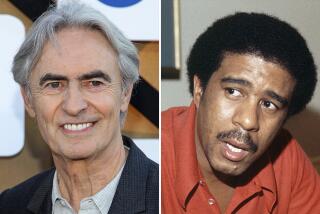Despite Its Slogan, KKBT Crossed Line in Mocking Asians
- Share via
I was appalled by the piece on KKBT-FM by Jerry Crowe (“ ‘The Beat’ Finds a Rainbow Urban Niche,” Calendar, March 31). It was a public relations dream: a smiley picture of a multiethnic cast of disc jockeys with quotes from a station manager about “The Beat” trying to appeal to listeners of all races.
The only non-KKBT employee quoted was a program director from a rival black station who envied its ratings. If The Times had bothered to check with community organizations about the reputation of “The Beat,” readers might have gotten a far different picture.
While the station broadcasts well-regarded public affairs programs and admirably tries to involve various communities, our organization’s initial experiences with the station gave us a more cynical view of its “No Color Lines” slogan.
Between January 1994 and April 1995, the Media Action Network for Asian Americans received numerous complaints on our telephone hotline about KKBT’s morning show, “The House Party.” John London and his sidekicks ran prerecorded skits mocking Asian Americans in the news with fake accents.
Targets included Michael Woo, Tritia Toyota, Judge Lance A. Ito and criminalist Dennis Fung, all of whom speak perfectly good English.
*
The effect was taking away their “American-ness” by consistently portraying Asian Americans as oddities who do not belong in their own country. MANAA has no problem with criticism or humor about what Asian Americans actually do. For instance, some people chastised the supposedly media-wary Ito after he granted an interview with Toyota.
That’s fair game.
But when “The Beat” and others use the race of Asian Americans as the basis of their humor or criticism, that’s when they’ve crossed the line.
MANAA’s letters and phone calls addressing this matter went unheeded. So, in December 1994, MANAA legal counsel Daniel M. Mayeda and I met with KKBT station manager Craig Wilbraham to outline our concerns. Despite Wilbraham’s promise to relay these concerns to London, the following April “The House Party” “mimicked” Fung in an agitated Chinese accent and threw in stereotyped references to kung fu.
Enough was enough. We went after the station’s bottom line by targeting four of its advertisers.
After listening to tapes of the show, two of “The House Party’s” sponsors--Nike and Kaiser Permanente--pulled their ads. By then, a multiethnic coalition, including the American-Arab Anti-Discrimination Committee, the National Hispanic Media Coalition and numerous UCLA “Beat” listeners had joined MANAA’s protest.
“The House Party” disc jockeys blasted us for three straight days and for the first and only time in our four-year existence, MANAA received hate calls filled with racial slurs.
“The House Party” had encouraged racial hostility rather than “The Beat’s” stated goal of “unity through music.” In July last year, Wilbraham finally agreed to grant us a meeting with London and company. In the meeting, we challenged the talent to find more creative ways of finding humor in Asian Americans based on what individuals actually do.
Last September, MANAA succeeded in negotiating a favorable resolution. In exchange for praising “The Beat” for responding to the concerns of the Asian American community, “The House Party” agreed to eliminate the comedy bits portraying Asian Americans. While we are glad that the station finally rectified the offending broadcasts that exposed the hypocrisy of its “No Color Lines” slogan, we regret that it required a 1 1/2-year campaign to effect this change.
Ironically, this entire controversy with KKBT-FM should’ve been known to Times readers long ago. Despite being aware of the controversy, Calendar waited until its resolution and then relegated the news to a one-paragraph “Morning Report” summary.
For years, MANAA has been at the forefront of challenging the ignorant, insensitive and often racist views people have about Asian Americans that have a direct impact on our community.
It’s sad that now we’re also having to do the work of Times reporters in bringing significant news stories to you.
More to Read
The biggest entertainment stories
Get our big stories about Hollywood, film, television, music, arts, culture and more right in your inbox as soon as they publish.
You may occasionally receive promotional content from the Los Angeles Times.










